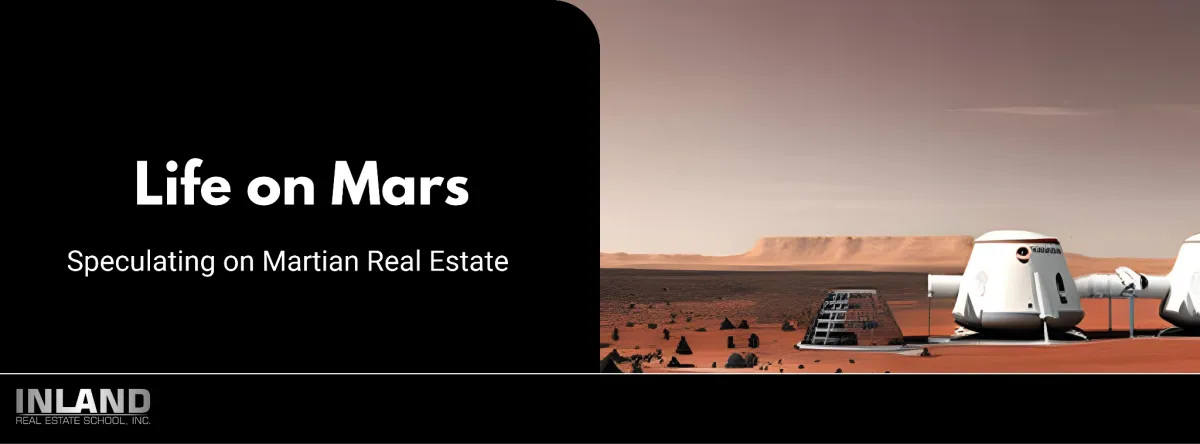
Life on Mars: Speculating on Martian Real Estate
For as long as humans have gazed at the cosmos, Mars has captivated our collective imagination. This red dot in the night sky has inspired science fiction writers and filmmakers alike, leading to an outpouring of literature, films, and television series exploring the concept of life on Mars. However, in recent decades, this speculation has shifted from the realm of fiction to the laboratories and boardrooms of space agencies and private companies. Driven by scientific advancements and the entrepreneurial spirit of figures like Elon Musk, discussions around the potential for Martian real estate have intensified (1).
The Possibility: Recent advancements in space exploration
The 21st century has witnessed remarkable advancements in space exploration. Mars, once the stuff of dreams, is now a key focus of space missions by both government agencies and private companies. SpaceX, under the leadership of Elon Musk, has laid out a vision for a self-sustaining city on Mars by 2050, a testament to the pace of progress (2). At the same time, NASA's Perseverance Rover, actively exploring the Martian landscape, is providing critical data about Mars' geology and climate, laying the groundwork for future human missions (3).
The Practicalities: What would real estate on Mars look like?
Creating Martian habitats that can support human life is an immense engineering challenge. Given Mars' hostile conditions - extremely cold temperatures, a thin atmosphere, and high levels of radiation - the architecture of Martian homes would likely be radically different from anything on Earth. Compact, domed structures with heavily insulated walls may form the basis of these buildings, providing protection from radiation and conserving heat. Within these structures, advanced life support systems would be necessary to maintain a breathable atmosphere, recycle waste, and possibly grow food. As technology evolves, we may see structures capable of extracting water from Mars' abundant ice deposits and converting it into oxygen for breathing and hydrogen for fuel (4).
Real Estate Regulations: Who would own the land? Discussion on space law
When it comes to the question of land ownership on Mars, we venture into uncharted legal territory. The 1967 Outer Space Treaty, signed by 110 countries, including all the major space-faring nations, clearly prohibits national claims of sovereignty over celestial bodies. However, it is less clear on the matter of private property rights. This ambiguity could be a source of potential disputes as the prospect of Mars colonization becomes a reality. To prevent future conflicts, international space law needs to evolve alongside advancements in space technology (5, 6).
Comparison: Real Estate on Earth vs Mars
In many ways, the concept of real estate on Mars flips the paradigm of property value on Earth. On Earth, factors such as location, proximity to amenities, and community infrastructure primarily determine property values. However, on Mars, at least in the early stages of colonization, property value would be defined more by basic survival requirements. Habitats that provide better protection from radiation, proximity to water resources, and self-sustainability could command higher values. Over time, as the colony grows, other factors such as proximity to landing sites, research facilities, or natural features could also become significant (9).
Future Outlook: Potential timeline for Mars real estate
The timeline for establishing a real estate market on Mars is still a matter of speculation. SpaceX has set an ambitious target to land humans on Mars within this decade, but the timeline for creating a self-sustaining colony, which is a prerequisite for a property market, is likely to be much longer. As the necessary technology continues to advance and legal issues are addressed, the prospect of a Martian property market could become a reality within this century, marking a watershed moment in human history (10).
Conclusion: Imagining a future with Mars real estate
While still speculative, the concept of Martian real estate has moved closer to the realm of possibility, due to advancements in space technology, evolving legal frameworks, and the growing interest of private companies. As we push the boundaries of space exploration, we move ever closer to the next great frontier – a Martian property market. The challenges ahead are daunting, but the potential rewards, from scientific discovery to the expansion of human civilization, make this journey worth pursuing.
If you found our blog post insightful and you're inspired to dive deeper into the real estate industry, we invite you to explore Inland Real Estate School. With over 25 programs and a proud legacy of serving more than 12,000 students, we are an established, fully licensed Real Estate School in Illinois.
We offer a multitude of learning modes - on-ground classes (live in person or live webinar), home-study, or online (computer-based reading) real estate classes for people who want to get started in the real estate world and want to become real estate brokers, managing brokers, or seek post-license and continuing education throughout the state of Illinois and nationwide online.
Additionally, we have partnerships with schools that provide nationwide education for mortgage brokers and appraisers. We also have affiliations with institutes that can assist you in securing licensing in additional states.
Whether you're a new real estate broker aiming to create your own identity or a seasoned professional looking to upgrade your skills, at Inland Real Estate School, we're committed to investing 110% in you.
References
Footnotes
Scharf, C. (2020). 'The Case for Space', Scientific American.
Musk, E. (2017). 'Making Life Multiplanetary', New Space.
NASA (2023). 'Mars Exploration Program', NASA.
Dartnell, L. (2013). 'Surviving on Mars', New Scientist.
United Nations Office for Outer Space Affairs (1967). 'Treaty on Principles Governing the Activities of States in the Exploration and Use of Outer Space, including the Moon and Other Celestial Bodies'.
Pop, V. (2023). 'The legal loopholes of extraterrestrial real estate', BBC Future.
Bell, J. (2015). 'Martian Real Estate', Air & Space/Smithsonian.
Foust, J. (2023). 'When will we see a Martian property market?' SpaceReview.